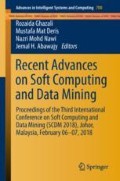Abstract
Cryptography is a practice of technique to ensure security by using the cryptography keys. Key derivation function (KDF) is a standard algorithm to generate these cryptographic keys. Stream ciphers are one of the cryptographic primitives that are used to construct the key derivation function namely key derivation function based on stream ciphers. Though the key derivation function based on stream ciphers have a great role in security, it is necessary to have a framework which can evaluate the security level of the different types of key derivation function based on stream ciphers. Random oracle model (ROM) is the current procedure to proofs the security of KDF. However, the security evaluation of ROM did not evaluate the degree of secureness of KDF as it can only proof either the KDF is theoretically secure or insecure. Hence, this research applies fuzzy evaluation method to form a framework to evaluate the degree of secureness of the KDF for different types of key derivation function based on stream ciphers. Key sizes and complexity attacks are two main variables which are considered in the design of fuzzy rule. The proposed method introduces the information extraction to construct fuzzy membership function and rules. The result from this proposal is effective to approximate the security aspect in the computer system as well as network system.
Access this chapter
Tax calculation will be finalised at checkout
Purchases are for personal use only
References
Krawczyk, H.: Cryptographic extraction and key derivation: the HKDF scheme. In: Annual Cryptology Conference, pp. 631–648. Springer, Berlin, Heidelberg (2010)
Bakhtiari, M., Maarof, M.A.: An efficient stream cipher algorithm for data encryption. Int. J. Comput. Sci. Issues 8(3) (2011)
Yun, J., Park, K.W., Shin, Y., Kim, H.D.: An efficient stream cipher for resistive RAM. IEICE Electron. Express 14(7), 20170179–20170179 (2017)
Vidal, G., Baptista, M.S., Mancini, H.: A fast and light stream cipher for smartphones. Eur. Phys. J. Spec. Top. 223(8), 1601–1610 (2014)
Chuah, C.W., Dawson, E., Simpson, L.: Key derivation function: the SCKDF scheme. In: IFIP International Information Security Conference, pp. 125–138. Springer, Berlin, Heidelberg (2013)
Bellare, M., Rogaway, P.: Random oracles are practical: a paradigm for designing efficient protocols. In: CCS ’93, pp. 62–73. ACM Press (1993)
Chuah, C.W., Dawson, E., Nieto, J.M.G., Simpson, L.: A framework for security analysis of key derivation functions. In: International Conference on Information Security Practice and Experience, pp. 199–216. Springer, Berlin, Heidelberg (2012)
Ekdahl, P., Johansson, T.: Another attack on A5/1. IEEE Trans. Inf. Theory 49(1), 284–289 (2003)
Lee, Y., Jeong, K., Sung, J., Hong, S.: Related-key chosen IV attacks on Grain-v1 and Grain-128. In: Australasian Conference on Information Security and Privacy, pp. 321–335. Springer, Berlin, Heidelberg (2008)
Quedenfeld, F.M., Wolf, C.: Advanced algebraic attack on Trivium. In: International Conference on Mathematical Aspects of Computer and Information Sciences, pp. 268–282. Springer International Publishing (2015)
A Distinguish attack on Rabbit Stream Cipher Based on Multiple Cube Tester. IACR Cryptol. ePrint Archive 780 (2013)
Al Maliky, S.B.S., Jawad, S.F.: Fuzzy logic-based security evaluation of stream cipher. In: Multidisciplinary Perspectives in Cryptology and Information Security, pp. 157–178. IGI Global (2014)
Azadegan, A., Porobic, L., Ghazinoory, S., Samouei, P., Kheirkhah, A.S.: Fuzzy logic in manufacturing: a review of literature and a specialized application. Int. J. Prod. Econ. 132(2), 258–270 (2011)
Goztepe, K.: Designing fuzzy rule based expert system for cyber security. Int. J. Inf. Secur. Sci. 1(1), 13–19 (2012)
Sallam, H.: Cyber security risk assessment using multi fuzzy inference system. IJEIT 4(8), 13–19 (2015)
Bhusari, K.P., Kale, S.G.: Intrusion detection in wireless network using fuzzy rules. Virus 10 (11)
Mohammed, S.A., Sadkhan, S.B.: Block cipher security evaluation based on fuzzy logic. In: 2013 International Conference on Electrical, Communication, Computer, Power, and Control Engineering (ICECCPCE), pp. 169–173. IEEE (2013)
Klir, G.J., Yuan, B.: Fuzzy Sets and Fuzzy Logic: Theory and Applications (1996)
Sumathi, S., Paneerselvam, S.: Computational Intelligence Paradigms: Theory and Application Using MATLAB. CRC Press (2010)
Mamdani, E.H., Assilian, S.: An experiment in linguistic synthesis with a fuzzy logic controller. Int. J. Man Mach. Stud. 7(1), 1–13 (1975)
Iancu, I.: A Mamdani Type Fuzzy Logic Controller. INTECH Open Access Publisher, Rijeka (2012)
Mendel, J.M.: Fuzzy logic system for engineering: a tutorial. IEEE Trans. Fuzzy Syst. (1995)
Mukherjee, P.: An Overview of eSTREAM Ciphers. Centre of Excellence in Cryptology, Indian Statistical Institute, Kolkata, India (2013)
Acknowledgements
This research was supported by FRGS Vot 1558, RMC UTHM, and Gates IT Solution Sdn.Bhd.
Author information
Authors and Affiliations
Corresponding author
Editor information
Editors and Affiliations
Rights and permissions
Copyright information
© 2018 Springer International Publishing AG
About this paper
Cite this paper
Mohd. Rahman, H., Arbaiy, N., Wen, C.C. (2018). Fuzzy Evaluation Scheme for KDF Based on Stream Ciphers. In: Ghazali, R., Deris, M., Nawi, N., Abawajy, J. (eds) Recent Advances on Soft Computing and Data Mining. SCDM 2018. Advances in Intelligent Systems and Computing, vol 700. Springer, Cham. https://doi.org/10.1007/978-3-319-72550-5_9
Download citation
DOI: https://doi.org/10.1007/978-3-319-72550-5_9
Published:
Publisher Name: Springer, Cham
Print ISBN: 978-3-319-72549-9
Online ISBN: 978-3-319-72550-5
eBook Packages: EngineeringEngineering (R0)

